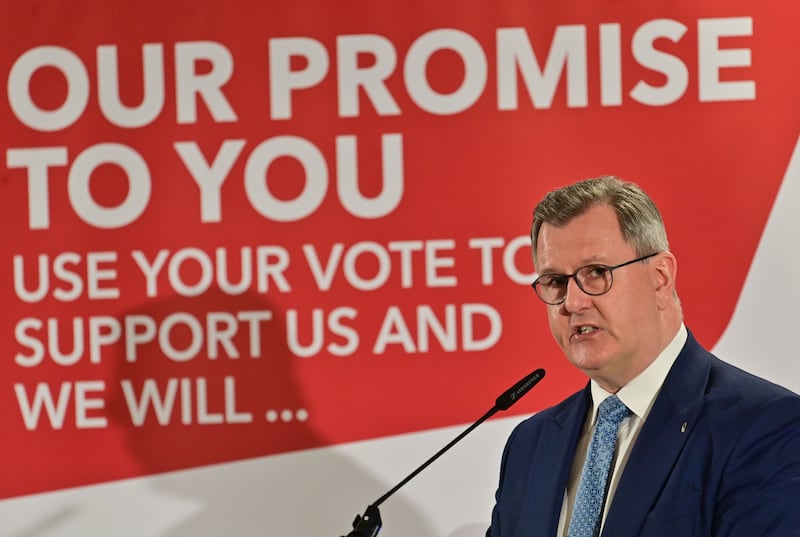IT is tempting to suspect the SDLP and Alliance of taking the mickey out of Sinn Féin by proposing a citizens’ assembly on Stormont reform.
The recommendation is in a report by Westminster’s all-party Northern Ireland Affairs Committee. When it was published this week, after a year-long inquiry, the recommendations that made headlines were replacing cross-community voting with a two-thirds super-majority and changing the titles of the first and deputy first ministers to the joint first ministers. These and other ideas are aimed at removing, or at least weakening, large-party vetoes.
But how can reform be enacted when the DUP and Sinn Féin are opposed? A citizens' assembly would put Sinn Féin on the spot as that is its stock answer to awkward questions on a united Ireland.
Read more:
- Arlene Foster's idea of a referendum on Stormont reform deserves discussion – Newton Emerson
- Newton Emerson: Bad behaviour improves prospect of Stormont reform
- ANALYSIS: Stormont reform would rob 'big two' of key electoral asset
SDLP proposals
The SDLP and Alliance have outsized influence on the Westminster committee. Sinn Féin abstains from membership and usually ignores invitations to testify, although it did appear at an inquiry 10 years ago – its first ever attendance – to discuss reform proposals for a Stormont opposition.
The UUP has no MPs, while the two DUP committee members are often at loggerheads with everyone else: both voted against every reform recommendation.
The SDLP clearly ‘won’ the inquiry, getting more of its proposals accepted than anyone else. However, the citizens’ assembly was mainly a suggestion from academics and it has a serious political basis.

In the 2020 New Decade, New Approach deal, all five main parties agreed the executive should select one or two “complex policy issues” every year and put them out to “civic engagement”, including “one citizens’ assembly per year”.
The pandemic stopped this happening but the mechanism is already sitting there for problems precisely like Stormont reform.
In 2021, the University of Liverpool and Queen’s University Belfast conducted a deliberative forum, a mini citizens’ assembly with 46 participants, compared to the 100 the Republic uses for citizens’ assemblies. This found a super-majority in favour of Stormont reform, including majorities of unionists, nationalists and ‘others’. It also found 71 per cent support for using a civic forum to decide the issue – only a referendum scored higher.
Read more:
- Dr Sean Haughey – We need to talk about restoring and reforming devolution
- Majority support for Good Friday Agreement structures among voters
- Mandatory coalition: Are we ready for reform?
The committee undertook a similar exercise this March, with the help of pollsters and academics, obtaining similar results. If a real forum were held, its outcome would presumably be little different.
Civic engagement exercises are rarely binding – politicians still make the final call. But they “give political cover to political decision making... and it is not a bad thing,” as Dr Gráinne Kelly of Ulster University explained to the committee.
Would Sinn Féin accept change?
There would be an additional embarrassment factor for Sinn Féin if it refused to refer reform to a civic assembly or dismissed the results, having made such an assembly a flagship policy on unification.
It might seem unbalanced to put extra pressure on Sinn Féin when dealing with a DUP boycott, DUP rejection of reform and DUP hypocrisy – the party supported ending mandatory coalition right up until its assembly election manifesto last May.

However, the DUP probably will accept reform in the end, with some political cover – partly because it has always supported it and partly because its present exhausted state has led it to see new selfish advantages in a period out of office. Four months before last year’s election, Sir Jeffrey Donaldson said the DUP was considering opposition.
Sinn Féin appears more deeply opposed. Last November, in response to a question from The Irish News, it said “reform at this stage equates to shifting the goalposts” and “no fundamental change should occur” without referendums north and south.
In general, it simply refuses to mention the subject. Last week, Michelle O’Neill once against called on the government to take “immediate action” to end the Stormont stalemate, yet once again declined to say what that might involve.

Sinn Féin fears reform would be used to exclude it. The party also quite openly considers Stormont a means to an end, a transitional arrangement en route to a united Ireland. It does not see Stormont serving that end without Sinn Féin in the executive.
Others can see a clear distinction between the advancement of Sinn Féin and the advancement of Irish unity but the party cannot and that underlies its resistance to reform.
It would be ironic if it took a citizens’ assembly to nudge Sinn Fein into accepting change.







